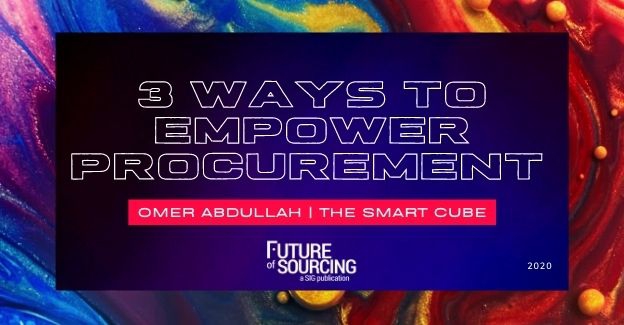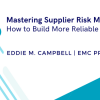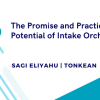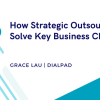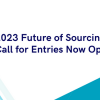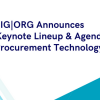Today's globalized world means that organizations are more exposed to risk than ever before. From building stronger supplier relationships to proactively mitigating risk, The Smart Cube's Omer Abdullah shares three ways to empower procurement teams to prepare for tomorrow, today.
When we look back at the globally disruptive events of the last 18 months, there aren’t a huge number of positives to draw on. But one significant silver lining is that major crisis events like the pandemic and the Suez Canal blockage have helped leading procurement teams step into the spotlight and demonstrate their skills at mitigating risk and ensuring business continuity.
However, the ability to proactively identify emerging risks across supplier portfolios and key categories isn’t a given for today’s procurement teams. It’s something that must be enabled through the right balance of real-time intelligence, technology that helps streamline and augment how procurement works, and deep risk, category, and commodity expertise.
In this article, I’ll run through three ways that empowering procurement teams with those capabilities can help organizations prepare for the next major supply chain crisis, and ensure that whatever the future brings, they’re ready.
1. Nurturing Stronger Supplier Relationships
Strong relationships with suppliers – especially strategic ones – have always been a valuable asset for organizations of all kinds. They can help you secure value-driving contracts, exclusive deals that add unique capabilities or products to your line-up, and crucially, make sure you get preferential treatment when supply becomes limited for any reason.
When the pandemic first started to ramp up in early 2020, many organizations saw the true value of those relationships first-hand. Those fortunate enough to have them were able to maintain the supply of goods they needed, while others found themselves unable to get what they needed at the right time to continue operating.
Procurement has always been great at building those relationships, but, because procurement teams’ time is so limited, and their attention is spread across so many suppliers, they don’t always have the capacity to develop relationships as much as they might like.
This is one of the “hidden” benefits of procurement empowerment. If you can do things like automate routine tasks for procurement teams or accelerate the delivery of category or risk insights to free teams from manual data analysis, you can buy them the time needed to build stronger relationships with suppliers.
You’ll free your procurement experts up to collaborate more closely with suppliers, creating opportunities for innovation and contract renegotiation, as well as helping to ensure the steady supply of essential goods when a crisis does strike.
2. Building a Deeper, Proactive View of Supplier Risk
Building and maintaining a clear view of supplier risk – and understanding its implications for the busines – is one of the most important responsibilities of any procurement department.
It takes a huge amount of time and effort to do this effectively, which has led many teams to fall into the trap of working constantly just to maintain a retroactive view of risk that’s very difficult to act on.
Things like annual risk reports for specific high-risk suppliers are great at giving you an overview of that supplier’s risk exposure and may even help you see emerging risk factors. But what they don’t do is tell you when those risks are likely to impact the business, or what remediating actions you could take before they happen.
Empowering procurement teams with a real-time view of supplier risk – one that alerts them to developing threats as they happen – can help the team evolve from constant reactive analysis to proactive risk mitigation.
This fast, timely view of supplier risk helps shift the entire mindset of the procurement function. Instead of looking back at historical risk trends and making assumptions about them, teams can assess risk insights immediately, when they’re most valuable, and act on them right away to drive value and safeguard the organization.
3. Helping Teams Look Beyond Suppliers and Keep a Closer Eye on Global Trends
Once you’ve freed the procurement team from time-consuming, retroactive supplier risk analysis, the team also gains more time to look beyond the supplier base and keep a closer eye on global commodity trends.
Reliable category and commodity insights can often be delivered through the same intuitive platforms as supplier risk insights. So, the procurement teams have a single source of insights, and a clear, unified view of risk across suppliers, categories and geographies.
It’s that complete, real-time view of risk that enables procurement teams to evolve their operations and mitigate the impacts of disruptive crisis events. Teams can immediately see where the biggest threats to their operations are emerging and quickly identify what actions need to be taken to mitigate that impact.
And as we’ve seen over the last couple of years, that level of insight really can be the difference between maintaining business as usual and seeing your operations grind to a complete halt.
Empower Procurement Teams and Prepare for the Next Major Disruptive Crisis Today
The last 18 months have brought immense disruption for procurement and supply chain teams. The crisis events we’ve seen have been severe, but looking back, they’re nothing new.
Today’s expansive global strategies and supplier portfolios have left procurement teams and their organizations more exposed to risk than ever before. We don’t know what the next crisis will look like, but we can say with some confidence that it’s coming – and history tells us that it’s probably coming sooner than we think.
By providing procurement teams with the time, resources and insights needed to adopt a proactive approach to risk management, organizations can take a huge step toward mitigating the impacts of events like those we’ve seen recently.


